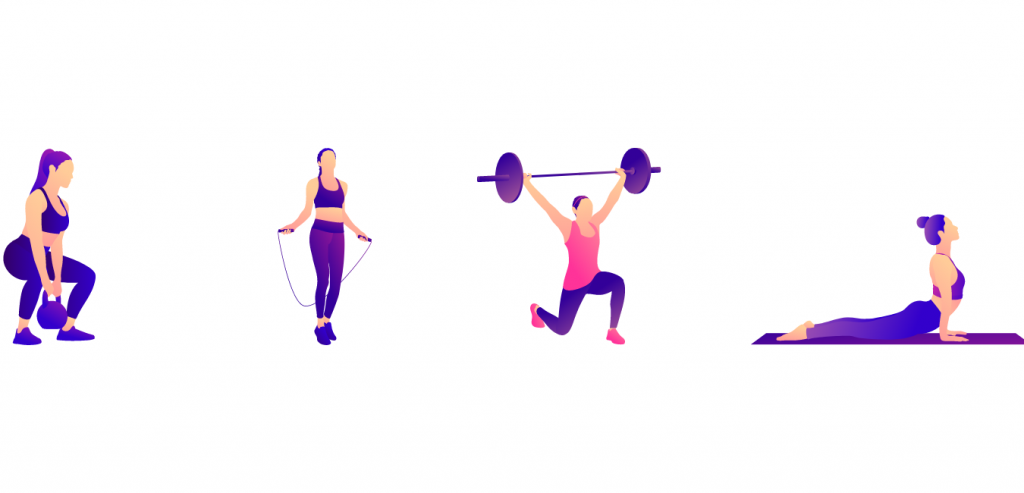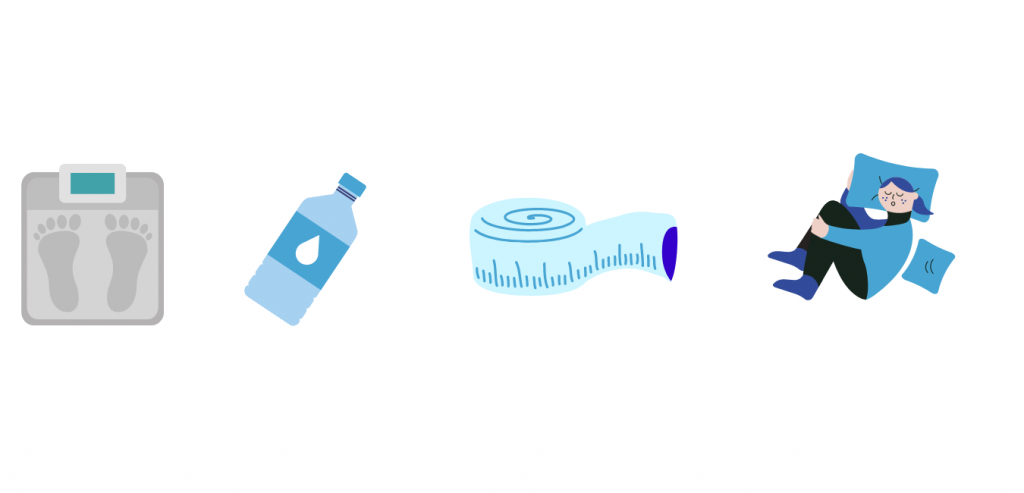Weightloss is not linear and it is completely normal
Weight-loss isn’t linear, it is not consistent and regular, which can be frustrating and de-motivating when your are on a weightloss journey. Good weeks followed by bad weeks, unexplainable ups and downs… But- the good news is, it is all normal, and you should not feel bad about it, nor should you give up because of it!

Losing weight and / or building muscle is not an easy or neat process. Body weight can fluctuate from day to day, depending on several factors such as:
- Water weight
- Dehydration
- Meal sizes
- Hormonal changes
- Constipation
For many people, stepping on the scale is the most highly anticipated and nerve-wracking part of their weight loss plan. For this reason, scale can be a dangerous tool but only when you can’t accept the fact, that weight is only a number and it does not define you or your progress. Sometimes we expect our bodies to work like simple machines. You eat less calories and you lose weight instantly.
If it was only that easy, right? But you see, you probably are here, reading this, because you have been struggling with weightloss yourself. You have maybe given it a go several times, but once, after a couple of weeks when your weight stagnates, you give up, thinking that whatever you do does not work. In reality these days you should just be strong, accept the fact that weight is just a number, a piece of data that can show your progress over time, and get through it. If you do that, I promise you one day or one week later your scale weight will dramatically drop. That is just how it is. That is what makes human body so fascinating and interesting.

There is something to understand: body weight is not simply the sum of your calorie intake. That number builds up of how much food you currently have in your stomach (bowel movements, meal sizes, types of ingredients you have choosen), how much water you’ve drunk that day (and how much water your body is retaining), how much your bones and muscles weigh…
Even the quality of your sleep, or the closeness of your menstrual cycle can affect scale weight. It is a complex thing. Eating more carbs or different kind of carbs or more sodium than usual and even physical/mental/emotional stress has an impact on the number the scale shows.
When you have more body fat to lose you may lose a decent scale weight within the first few weeks, but it doesn’t necessary translate to significant visual improvement. The opposite happens when you have less fat to lose. The scale might not change at all, however you will see more changes on your body when you compare photos for instance.
Typically getting rid of the first 5-10 lbs can be significantly easier than to lose than the last 5-10. As fat loss slows down, and you have less body fat to lose your body fights fat loss harder than it did initially. Your body wants to hang onto that fat to keep it as emergency energy storage. So the closer you get to your goal, you will have to be even more consistent and put in even more work, for smaller results.

Being aware and understanding these facts before you start dieting and excercising will make your progress more successful and less stressful. An other tool I recommend to my clients is to track inches and take progress photos alongside with weekly scale weight checks.
So, when you lost 3 lbs every week for a whole month and then “only” 1.5 lbs the next week and 0 the following, it is a stall. A stall that does not mean that you aren’t progressing. It especially doesn’t mean your program needs to be adjusted, you have to drastically cut calories or that you have to do excessive cardio, but it’s more likely tells you that you have to stay on track and be consistent with what you are doing and be patient with yourself.

Numbers… Numbers of weight, inches or body fat percentages can easily become an extra stress source that works against you and your goal. In the end you will find yourself unintentionally overthrowing your hormonal balance that will cause you even more water retention and a higher number on the scale. Just chill.
Also keep in mind that both your muscles and your bones will weigh more and more as you strength train. When you don’t have that much fat to lose, but you are dieting and strenght training to gain lean muscle mass, the scale might not be moving down. However when you look at the mirror you will se a completely different person.
Don’t define your success/ failure simply by what the numbers are on the scale. When you are in doubt, just ask yourself questions. How do you feel about yourself? Do you have more energy? Are you feeling stronger and healthier? Is your sleep better? That is when you see how far you have come.
Remember: when the scale rise, it doesn’t always mean you’ve gained fat. If you’ve been very strict about your diet and dedicated to working out every morning, like clockwork, if you do your best every single day, results will follow! What’s important is that you understand that it’s a process and not something that’s going to happen overnight or in a matter of weeks. Look at the bigger picture and see your end goal!
Tip: set smaller goals each week. If you still haven’t achieved that six pack and bubble butt by the end of the week, it can make you feel discouraged and defeated. When this happens you open up yourself failure and give up the whole process, being back to square one. But if you stick with realistic goals, for instance to lose an inch or two this week, you will se that you accomplished something. There is no bigger motivation than allowing yourself to see and celebrate your very own progress. That is how you win!
